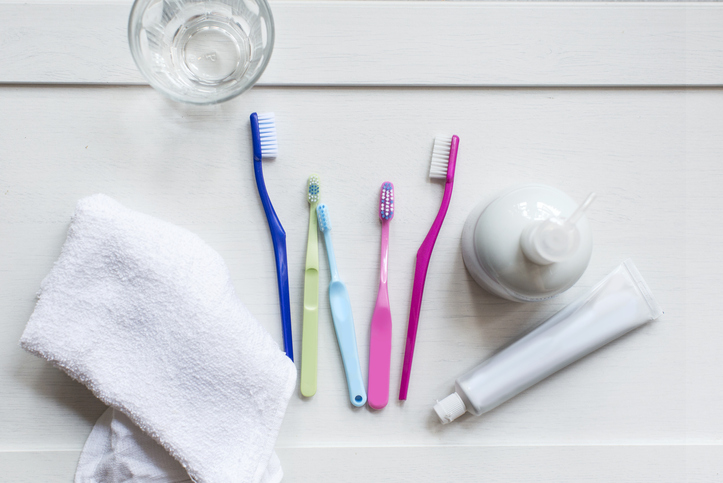Put Your Probiotics Where Your Mouth Is
Put Your Probiotics Where Your Mouth Is

I recently came across an interesting story about an animal shelter in St. Louis. The animals in the shelter were recently given an oral-care probiotic, which was donated to the animals by a company called ProBiora HealthTM.
“During the pandemic, many animals aren’t able to receive dental care,” said Chris Koski, president and CEO of ProBiora Health, referenced in this report.
“As an animal lover and a former St. Louisan, my first thought was to see if we could help some local animals that are looking for forever homes.”
Just like these animals, many of us may have issues receiving dental care as quickly as we would like to right now (even though all 50 U.S. states have taken initiatives towards reopening).
Due to COVID-19, many of us may be way overdue for a teeth cleaning or dental exam. I know I am. In addition to this, stress eating with sugar and ultra-processed foods can wreak havoc on your dental health. But we still have to be proactive about our overall health, (especially now), and this includes our oral health.
In the overall scheme of things, teeth cleaning may be the least of your worries right now. But remember if you develop advanced gum disease, you may increase your risk of developing some serious health issues such as cancer, heart disease, diabetes and rheumatoid arthritis.

You likely know probiotics as the live microorganisms that help your gut health. You may not know that probiotics can also have a positive impact on oral health.
Research about probiotics for oral health is still in its infancy, and further research is needed. However, recent research has suggested potential applications for probiotics to be useful in preventing and treating oral infections, including dental caries, periodontal disease and halitosis (bad breath). The idea is that probiotics will help facilitate a healthy balance of good and bad bacteria in the mouth, thereby helping to maintain healthy teeth and gums.
There is a microbiome in your mouth - just as there is in your gut.
“About 700 kinds of microorganisms exist in the human mouth, and these microbes constitute the human oral microbiota. It is one of the most complex microbial communities in the human body,” according to one source.
And you want to keep this oral microbiome healthy by maintaining an adequate, diverse amount of the good bacteria.
So consider incorporating a probiotic toothpaste or probiotic mouthwash into your oral care routine. Consuming excessive amounts of sugar and smoking cigarettes may be detrimental to the oral microbiome.
I’m not suggesting that you skip going to the dentist. Probiotics do not replace a teeth cleaning or gum exam, but probiotics are something you can use to be proactive about both your gut and oral health. And if you are overdue for a cleaning, you want to at least be practicing the best oral care possible at home.
You need healthy gums for healthy teeth.
Many studies have shown that a balanced diet plays an essential role in maintaining periodontal health. If your diet is rich in fresh fruits and vegetables, you’re probably getting most of the nutrients your gums need. Some of these nutrients include:
- Calcium. Did you know that more than 99 percent of the body’s calcium is stored in the bones and teeth? You probably know this mineral is key in building and maintaining strong bones and teeth. It may even help prevent tooth loss. And having a calcium deficiency may increase your risk for gum disease. In your mouth, calcium helps harden your enamel and strengthen your jawbone. You can get calcium from salmon, turnip greens, kale, broccoli and more.
- Phosphorus. This mineral works hand-in-hand with calcium to help strengthen your teeth. Calcium needs phosphorus to do its job. Dietary sources of phosphorus include salmon, halibut, yogurt, milk, turkey, chicken, beef, lentils, almonds, peanuts, eggs and bread.
- Vitamin D. It is very important to consume enough vitamin D because, like phosphorus, it helps your body absorb calcium. A deficiency in vitamin D may cause burning mouth syndrome. Symptoms of this condition may include a burning mouth sensation, a metallic or bitter taste in the mouth and dry mouth. The NIH reports studies, which suggest that a deficiency of dietary vitamin D leads to periodontal inflammation and a delay in post-surgical periodontal healing. To see how much vitamin D you may need and which foods contain it, click here.
- Vitamin E. There are a few studies, which report favorable effects of vitamin E in maintaining gum health and controlling inflammation. A reduction of vitamin E has been reported in patients with periodontal diseases compared to healthy individuals. Foods containing vitamin E include almonds, spinach, avocados, sunflower seeds, butternut squash, red peppers and peanut butter.
- Potassium. Like vitamin D, potassium may help improve bone mineral density. It also works with magnesium to prevent blood from becoming too acidic, which may deplete calcium from your bones and teeth. High levels of potassium are found in figs, dried fruits (prunes and dates), nuts, avocados, bran cereals, lima beans, broccoli, peas, tomatoes, potatoes (especially their skins), sweet potatoes, winter squash, citrus fruits, cantaloupe, bananas and kiwi.
- Iron. A deficiency in this mineral may cause inflammation of the tongue. It may also cause a person to develop sores in their mouth. Iron-rich foods include red meat, pork, poultry, seafoods, beans, spinach (and other leafy greens), peas, cherimoyas and iron-fortified cereals.
- Vitamins B12 and B2 (riboflavin). You may also develop mouth sores when you do not consume enough of the vitamins B12 and B2. For food sources of B12, click here and for riboflavin, click here.
- Vitamin B3 (niacin). A deficiency in this vitamin may cause bad breath and the development of canker sores. Chicken, fish, milk, eggs, rice, legumes and peanuts are rich in B3.
- Vitamin C. This vitamin promotes gum health. Too little vitamin C may lead to bleeding gums and loose teeth. Citrus fruits, strawberries, pineapple and mango are rich in this vitamin.
It is also important to undergo routine nutrient testing in order to identify any nutrient imbalances or deficiencies. If necessary, a competent healthcare professional can work with you on making dietary changes and recommend quality supplements.
And, of course, always brush and floss!
Enjoy your healthy life!
The pH professional health care team includes recognized experts from a variety of health care and related disciplines, including physicians, attorneys, nutritionists, nurses and certified fitness instructors. This team also includes the members of the pH Medical Advisory Board, which constantly monitors all pH programs, products and services. To learn more about the pH Medical Advisory Board, click here.







